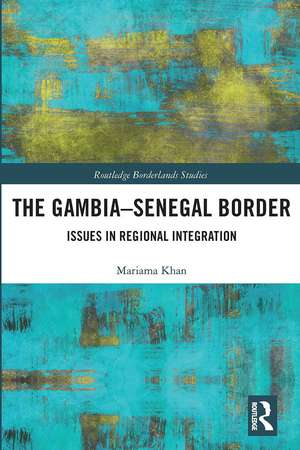The Gambia-Senegal Border: Issues in Regional Integration: Routledge Borderlands Studies
Autor Mariama Khanen Limba Engleză Paperback – 18 dec 2020
The book investigates how the two states are constantly pulled between impulses of cooperation and de-escalation, and a competitive intimacy that disregards kinship ties and re-activates tensions. In particular, the book shows how these interstate dynamics play out across the border itself, where indigenous ideas of relatedness are reflected in the cross-border transport and trade sectors, and in the religious networks that straddle the two countries.
This book's skilful exploration of intersecting macro-level and micro-level relations in the Senegambia region will be of interest to scholars of African politics, regional studies, international development and border studies.
| Toate formatele și edițiile | Preț | Express |
|---|---|---|
| Paperback (1) | 259.72 lei 6-8 săpt. | |
| Taylor & Francis – 18 dec 2020 | 259.72 lei 6-8 săpt. | |
| Hardback (1) | 767.07 lei 6-8 săpt. | |
| Taylor & Francis – 30 mai 2019 | 767.07 lei 6-8 săpt. |
Preț: 259.72 lei
Preț vechi: 318.82 lei
-19% Nou
Puncte Express: 390
Preț estimativ în valută:
49.70€ • 51.70$ • 41.03£
49.70€ • 51.70$ • 41.03£
Carte tipărită la comandă
Livrare economică 14-28 aprilie
Preluare comenzi: 021 569.72.76
Specificații
ISBN-13: 9780367728731
ISBN-10: 0367728737
Pagini: 238
Dimensiuni: 156 x 234 mm
Greutate: 0.44 kg
Ediția:1
Editura: Taylor & Francis
Colecția Routledge
Seria Routledge Borderlands Studies
Locul publicării:Oxford, United Kingdom
ISBN-10: 0367728737
Pagini: 238
Dimensiuni: 156 x 234 mm
Greutate: 0.44 kg
Ediția:1
Editura: Taylor & Francis
Colecția Routledge
Seria Routledge Borderlands Studies
Locul publicării:Oxford, United Kingdom
Public țintă
Postgraduate and UndergraduateCuprins
Introduction 1. The Politics of Senegambian Kinship Discourses 2. The Political and Economic Context of the Gambia-Senegal Border 3. Transport, Cross-Border Practices and Interstate Political Relations 4. Politics and the Disintegration of the Common Transport Newtwork, 2000-2015 5. Tactics for Survival: Jakarta, Civil Society and the Media 6. Cross-Border Trade and the Gambia-Senegal Relations 7. Senegambia's Talibee Networks, the State and Cross-Border Exchange 8. Conclusion
Notă biografică
Mariama Khan is a Gambian scholar, poet, filmmaker and cultural activist. She currently teaches African History, West African Cinema and African Civilizations at the Lehman College Africana Studies Department, City University of New York (CUNY).
Recenzii
"In this insightful and compelling book, Khan offers a nuanced examination of the contentious border between the Gambia and Senegal. Much can be gleaned from reading her account in this groundbreaking analysis. African politics is replete with problematic borders that were defined arbitrarily and unevenly by European conquest. In this case study of an area that has brought much political focus, Khan deftly navigates the terrain with precision that will create a lasting dialogue in African Studies courses." — Mark Christian, Professor & Chair, Department of Africana Studies, Lehman College – City University of New York, USA
"This book examines issues of cross-border trade, transport, and religious networks, in the Senegal/Gambia borderlands, both in themselves and in relation to politico-economic development. Kinship notions are used to investigate how culture and language affect inter-state relations. The study contributes significantly to the scarce supply of published research on these issues. It is heavily empirical, thereby revealing new perspectives and new areas for further research. It is refreshing." — Jeggan C. Senghor, University of London, UK
"Mariama Khan offers insight and long experience, from varied angles, on a nation within a nation, with bigger implications abroad. Here genealogical, cultural, religious, and commercial continuities belie superficial differences of tongue, bread, and currency, provoking deep questions on former colonies, borders, their meanings, and manipulations. A read to recommend." — Parker Shipton, Professor of Anthropology and Research Fellow in African Studies, Boston University, USA
"This is a wonderful and essential book on a significant topic: the ways in which African leaders can use affective cultural symbols to build better interstate relations and regional integration. Khan’s book is a major contribution to political thought, African history, and regional integration theory. This book, appropriately positioned away from technocratic economic thinking, is among the finest in terms of bottom-up approach to regional cooperation and inter-state conflict resolution." — Nimi Wariboko, Walter G. Muelder Professor of Social Ethics, Boston University, USA
"This book examines issues of cross-border trade, transport, and religious networks, in the Senegal/Gambia borderlands, both in themselves and in relation to politico-economic development. Kinship notions are used to investigate how culture and language affect inter-state relations. The study contributes significantly to the scarce supply of published research on these issues. It is heavily empirical, thereby revealing new perspectives and new areas for further research. It is refreshing." — Jeggan C. Senghor, University of London, UK
"Mariama Khan offers insight and long experience, from varied angles, on a nation within a nation, with bigger implications abroad. Here genealogical, cultural, religious, and commercial continuities belie superficial differences of tongue, bread, and currency, provoking deep questions on former colonies, borders, their meanings, and manipulations. A read to recommend." — Parker Shipton, Professor of Anthropology and Research Fellow in African Studies, Boston University, USA
"This is a wonderful and essential book on a significant topic: the ways in which African leaders can use affective cultural symbols to build better interstate relations and regional integration. Khan’s book is a major contribution to political thought, African history, and regional integration theory. This book, appropriately positioned away from technocratic economic thinking, is among the finest in terms of bottom-up approach to regional cooperation and inter-state conflict resolution." — Nimi Wariboko, Walter G. Muelder Professor of Social Ethics, Boston University, USA
Descriere
This book interrogates the validity of longstanding claims that Gambians and Senegalese are "one" people in two countries and explores how that claim intersects with the politics and development needs of the two countries.












